The mix of artificial intelligence and economics is changing digital markets a lot. As AI gets better, it’s making a big difference in how markets work. Knowing about AI search economics is key because it shows how these changes will shape the future of AI and the economy.
This article will look at the big changes AI is bringing. We’ll see how it’s changing how people shop and the overall economy.
Key Takeaways
- AI search economics is reshaping digital marketplaces.
- Future trends in AI will significantly impact economic paradigms.
- AI technology is altering consumer behavior.
- Understanding the implications of AI is vital for businesses.
- Digital marketplaces are increasingly dependent on AI advancements.
Introduction to AI and Economics
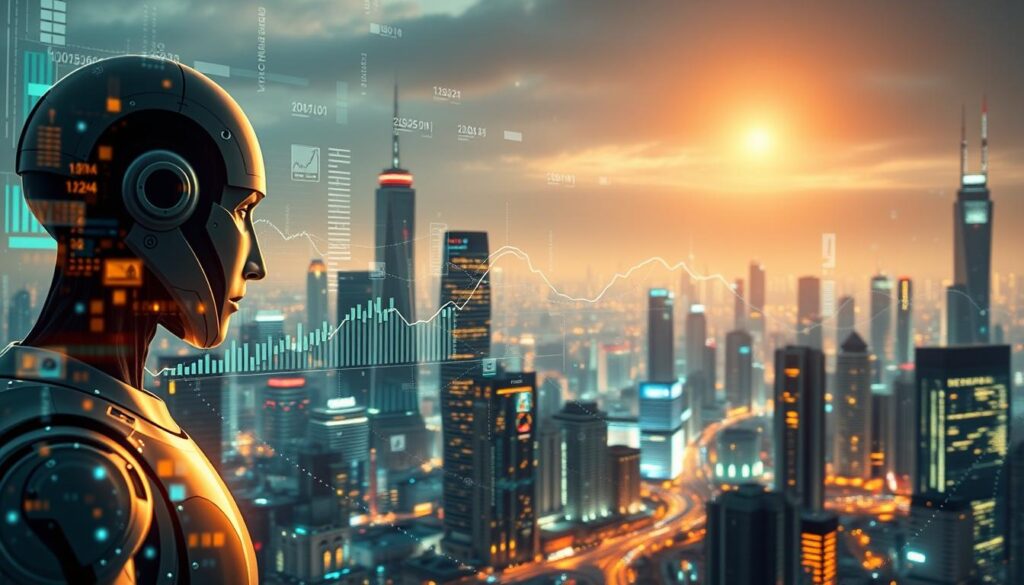
Artificial intelligence (AI) is changing economics in big ways. It brings new solutions to old problems. An AI technology overview shows how it helps in many areas, like making better decisions and improving supply chains.
The economic implications of AI are wide-ranging. It boosts productivity and changes how we interact with customers. AI lets companies do more creative work by automating simple tasks. But, it also raises big questions about jobs and the future of work.
AI is changing how markets work. Businesses use AI to compete better, leading to new products and services. Knowing how AI affects economics is key for those who want to use it for financial success.
AI’s fast growth means we need to think about ethics and rules. For those looking to make money with AI, learning about AI-driven economic opportunities is a good start.
AI’s Transformative Role in Digital Markets
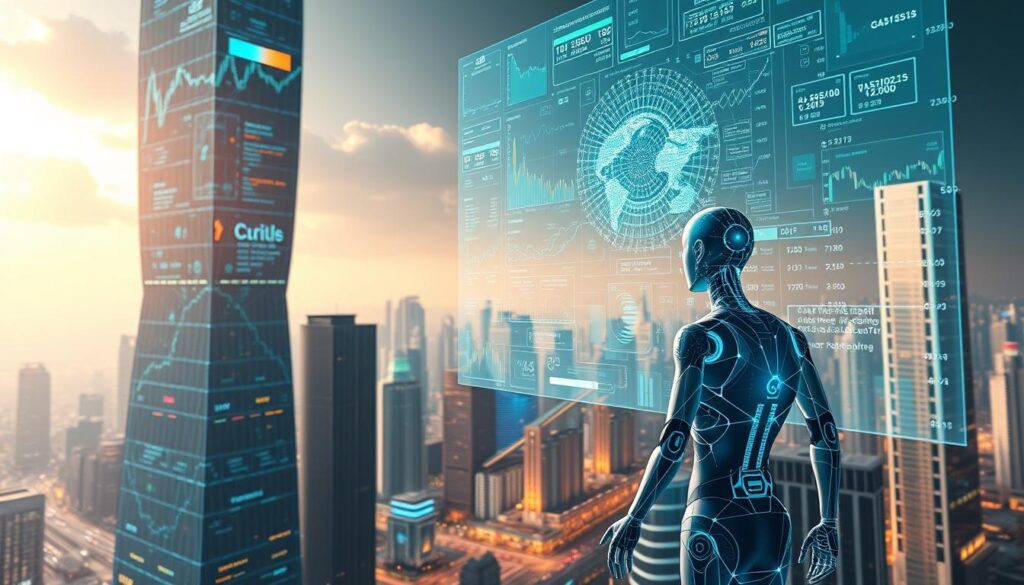
AI has changed how companies work and connect with customers. It uses advanced algorithms to understand what people want and offer personalized services. This shift helps businesses adapt to new tech, leading to big changes in the economy.
Big names like Amazon use AI to make their operations smoother. They use machine learning to manage stock and suggest products, making customers happier and more loyal. This shows how AI is changing the game in business.
Social media sites also use AI to show users content they’ll like. By analyzing how people interact with posts, they create ads that work better. This helps brands connect with their audience in meaningful ways.
As companies keep finding new ways to use AI, its importance grows. AI is key to making businesses more efficient and improving how they interact with customers. The impact of AI on the economy is clear.
Future of AI Search Economics: Trends & Impact
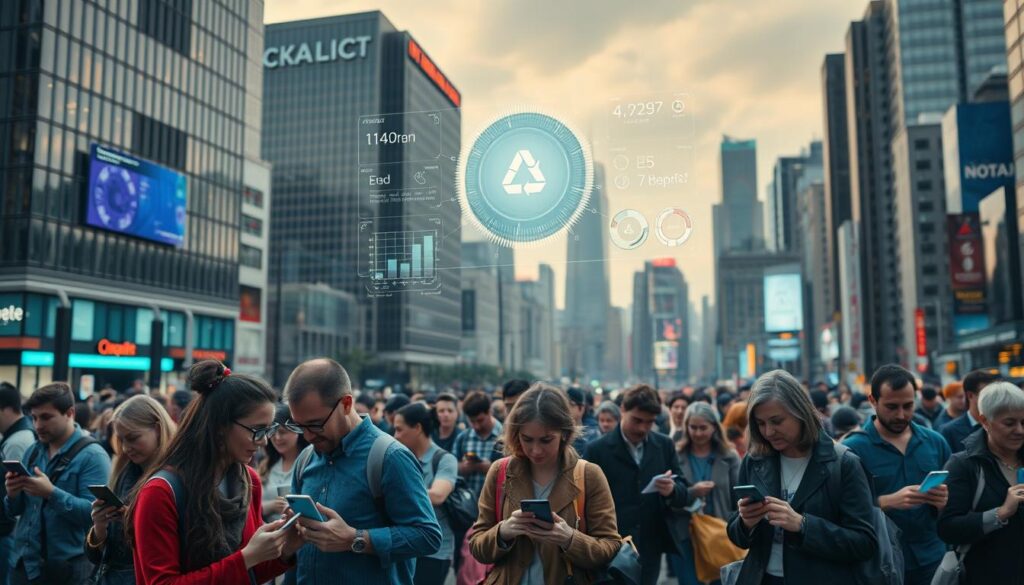
The world of AI search economics is changing fast. It shows how AI changes how we shop and make choices. People now want things that fit their needs exactly and quickly.
AI is making it easier for businesses to reach customers. They can learn what people like, making their ads more effective. This change is making the market more open, letting new companies grow alongside big ones. Amazon and Google are working hard to keep up with these changes, staying ahead in the digital world.
AI is getting better at predicting what we might want. This helps businesses understand what we’ll buy next. It gives us more power to choose what we want, making our shopping better.
As businesses change, the AI market will too. This means companies must keep improving to stay ahead. This change helps us, the consumers, and pushes businesses to be more creative and customer-focused.
| Trend | Description | Implication for Businesses |
|---|---|---|
| Personalization | Customized user experiences based on AI analysis of consumer data. | Increased loyalty and sales from targeted marketing. |
| Accessibility | Enhanced access to AI tools and platforms for various market participants. | Emergence of new competitors in the AI space. |
| Predictive Analytics | Use of AI to forecast consumer preferences and trends. | Ability to adapt offerings and marketing strategies proactively. |
In short, AI is changing how we shop and the market. Knowing these changes is key for businesses to succeed in the fast-paced world of AI.
Economic Projections from AI Integration

The use of artificial intelligence in the economy is changing a lot. Experts say it could add up to $7 trillion to the global GDP in the next 10 years, according to Goldman Sachs. McKinsey thinks it could be even more, up to $25.6 trillion. This makes us think a lot about the good and bad sides of AI.
These numbers show AI’s big financial potential. But they also remind us to look closely at how AI affects jobs. Economists like Daron Acemoglu say AI can both create and destroy jobs. We need to think about how it changes our economy and society, like income gaps.
| Source | GDP Growth Projection ($ Trillions) |
|---|---|
| Goldman Sachs | 7 |
| McKinsey | 25.6 |
Knowing these different views helps leaders and businesses make better choices. As AI gets better, we must keep watching its effects on the economy. For more info, check out AI and Robotics Integration.
Growth of AI Adoption Across Industries

The world of AI is changing fast as more companies see its value. 77% of companies are now using or thinking about AI. This shows how important it is to keep up with AI trends to stay ahead.
Many industries implementing AI are leading the way. For example, manufacturing uses AI to make production better. Healthcare uses AI to improve diagnosis and care. IT uses AI for security and analyzing data, showing AI’s wide range of uses.
These changes mean a lot for the future. Companies that use AI can work better and offer new services. Keeping up with AI news is key. For more on AI tools changing businesses, check out current AI tools.
Consumer Interactions with AI Technology
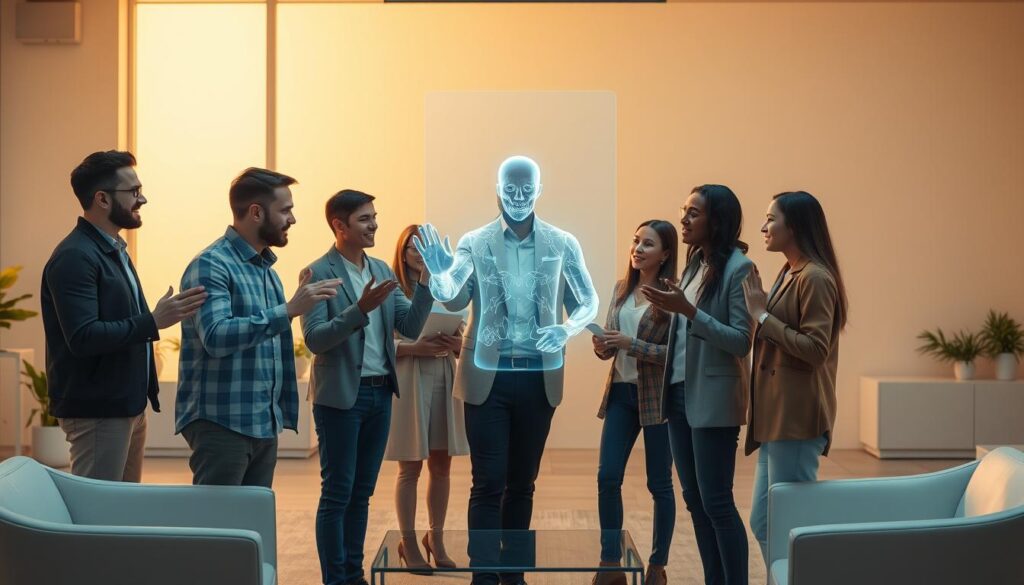
AI technology is now a big part of our daily lives. We see it in virtual assistants like Amazon’s Alexa and Apple’s Siri. It also helps with making big decisions, like in financial planning. This makes our lives easier and helps us make better choices.
How people interact with AI changes based on their age and tech skills. Young people often pick up on new AI tools quickly. But older folks might be slower to adopt them. This shows we need to teach and market AI in ways that fit different ages.
Some AI tools are designed to be easy to use. This makes them more accessible to everyone. As AI becomes more common, it’s important to watch how people use it. This helps us make AI better for everyone.
Impacts of AI on Workplace Productivity

AI is changing how we work. Companies using AI see big boosts in how well they do things. They could see a 40% jump in getting things done faster.
This change isn’t the same for everyone. Some industries will see bigger benefits than others.
The manufacturing world is expected to see huge changes. It could gain around $3.8 trillion by 2035. This shows how big a deal AI can be.
Companies can use AI in special ways to solve their own problems. This leads to better results.
AI does more than just make things faster. It lets workers focus on harder tasks. This makes them more productive. It shows how AI can really change things for different industries.
| Industry | Projected AI Gains by 2035 | Estimated Productivity Increase |
|---|---|---|
| Manufacturing | $3.8 trillion | 40% |
| Healthcare | $1 trillion | 30% |
| Retail | $500 billion | 25% |
AI is making workplaces more efficient. Companies that use it well will do better. AI is key to making things better at work.
Public Trust in AI Technologies

The public trust in AI is a big issue as we use these tools more in our lives. It’s important to know what people think about AI. Surveys show that about 51% of people are more worried than excited about AI in our daily lives.
This worry comes from concerns about data privacy and security. These issues affect how much people trust AI.
As AI becomes more common, people want more say in how it affects them. For example, 55% of U.S. adults want more control over AI’s use. They want to know how AI is used in their lives.
Trust is key for more AI use in work and personal areas. Many people worry about AI’s ethics, with 66% concerned about AI’s accuracy and reliability.
AI experts also have concerns, with 56% worried about too little government oversight. This shows a gap between what experts know and what the public thinks. Fixing these issues could help build more trust in AI.
The future of AI adoption trends depends on managing these fears. We need a balance that makes people feel safe while still encouraging new ideas.
Regulatory Landscape and AI Governance
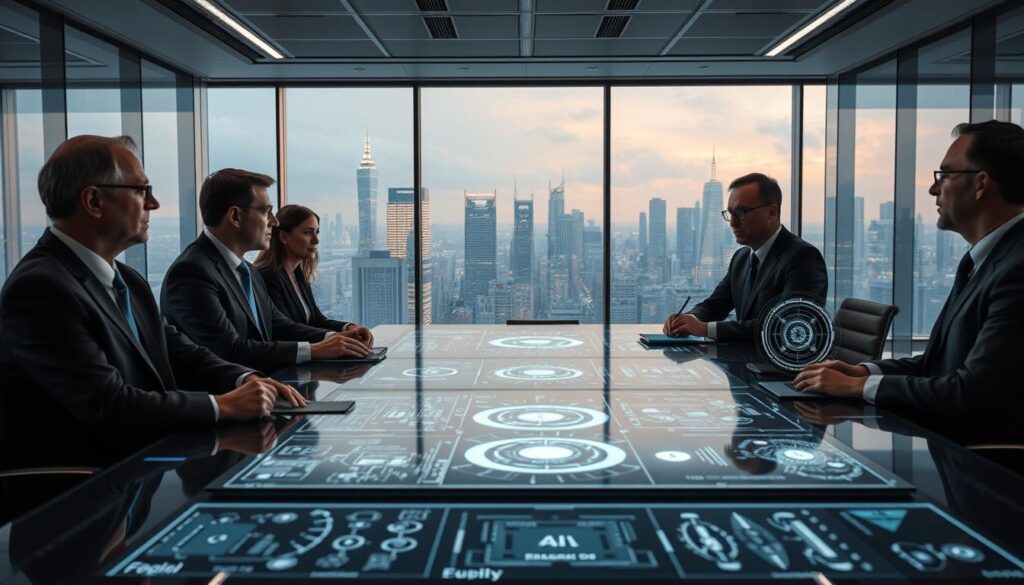
Artificial intelligence (AI) is quickly becoming a part of many industries. This has made it clear that we need strong AI rules. Organizations and governments worldwide are working hard to keep up. The OECD and the EU are leading the way in creating guidelines for AI.
These guidelines focus on using AI ethically, being transparent, and being accountable. AI rules must tackle big issues like data privacy, biases in algorithms, and jobs lost to technology. The world needs to work together to create standards for AI.
Success in AI rules depends on teamwork between governments, businesses, and civil groups. Including different views is key to making AI rules that work for everyone. If we don’t do this, the rules might not help or could even make things worse.
Being proactive in setting up AI rules is crucial for the future of technology. Joining global efforts can help shape local practices. This ensures AI benefits us while keeping risks low. For more on this, check out international reports for detailed advice on AI governance.
Potential Challenges and Risks of AI Integration
Artificial intelligence is being used in many areas, but it comes with challenges and risks. It’s important for businesses and governments to understand these challenges of AI integration. One big worry is job loss, as machines take over tasks that humans used to do.
As AI gets better, people might find it hard to keep up. This could lead to economic problems.
There are also risks of AI adoption like privacy issues and biased algorithms. These could make social problems worse. It’s key to make sure AI helps everyone, not just some.
To tackle social equity issues in AI, we need to work together. We should make policies that help everyone, use AI in a fair way, and talk to communities. This way, we can make AI better for everyone, not just a few.
| Challenge/Risk | Description | Impact |
|---|---|---|
| Job Displacement | Automation replacing traditional jobs | Increased unemployment rates |
| Data Privacy | Concerns over the use of personal information | Loss of trust in AI systems |
| Algorithmic Bias | Biases in data leading to unfair outcomes | Reinforcement of social inequities |
| Economic Inequality | Disparities in AI access and benefits | Widening income gaps |
Future Innovations in AI Search Economics
The world of AI search economics is always changing. New technologies and methods are coming along. These changes will change how we find and use information and services.
As companies use more AI, the market will get more lively and quick to respond. New algorithms will give us faster and more precise search results. This will make our online experiences much better.
Machine learning models are key to these changes. They learn from the market in real time. This lets companies offer searches that are just right for each person. Google and Microsoft are already working on this.
Thanks to AI, businesses can now spot trends in what people like and do. This helps them make marketing that really speaks to their audience. It makes users happier and helps companies make more money.
AI will also make search algorithms more open and clear. This will build trust with users. It will also help companies that focus on doing the right thing with AI. AI will keep playing a big role in how markets and people interact online.
Conclusion
Artificial intelligence is changing how we think about economics. AI is making big changes in search, marketing, and how we work. It’s important to keep studying AI to understand its full impact.
AI will make search results more personal and help businesses work better. But, we need to be careful with AI. We must use it in a way that builds trust and brings benefits.
AI will have a huge impact on the economy as more industries use it. We need to make sure AI helps the economy grow. Studying AI is key to making smart choices in search economics. For more on AI and money, check out this interesting article.







